
We’ve talked before about how much we love libraries — and about how free and equitable access to books can help improve health literacy. But lending books is far from the only way our libraries contribute to the health of our communities. So today, dear reader, we’re back with some more appreciation for the role of public libraries in public health promotion.
In his 2023 advisory on loneliness and isolation, U.S. Surgeon General Vivek Murthy listed libraries as a key part of the social infrastructure that makes social connection possible. Libraries serve as what sociologists call “third places” — not home, not work, but a third place where people can gather, communicate, and build relationships.
And unlike many other physical parts of the social infrastructure, libraries provide free, public indoor spaces. They’re a reliably safe and weather-proof option for people experiencing homelessness, kids who need a place to hang out after school, and people of all ages who simply have nowhere else to go.
With all this gathering going on, libraries have lots of opportunities to reach people and share information. In fact, many public libraries now employ social workers to help people find and access government benefits and services. Need to apply for disability payments or SNAP benefits? Libraries can help with that. Need to find emergency housing or mental health care? Libraries can help with that, too. For people who don’t have reliable internet access or have trouble navigating information online, libraries may be a lifeline to the benefits they need.
And public libraries don’t only provide information and help navigate services — they also provide some health and social services directly.
- During the COVID-19 pandemic, libraries went beyond communication and worked to distribute masks, test kits, and even vaccines to community members.
- In response to the opioid epidemic, libraries began stocking Narcan and training staff to help in case of overdoses.
- To address food insecurity, libraries don’t only provide food and nutrition education — many distribute meals, run on-site food pantries, or plant community gardens.
- To support patrons living with mental health conditions, many libraries train staff in mental health first aid and offer free workshops on mental health topics.
So next time you’re working on a health comm project that could use a community-based approach, consider teaming up with local libraries. To get started, check out the Midwest Public Health Training Center’s public library collaboration toolkit. And if you’ve partnered with libraries and have tips to share, let us know! We’d ❤️ to hear about your experiences.
The bottom line: Public health and public libraries make a perfect team — so try including local libraries in your health comm partnerships.
Copy/paste to share on social (and tag us!): What do public libraries have to do with public health? A whole lot! CommunicateHealth explains why you’ll want to team up with libraries on your health comm projects: https://communicatehealth.com/wehearthealthliteracy/partnering-with-public-libraries-to-promote-public-health/ #HealthCommunication #HealthLiteracy #HealthComm
Browse recent posts